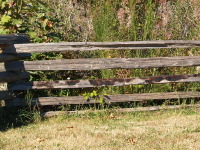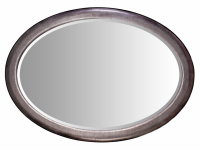Lesson 19 - Modal Verbs

In this lesson you'll learn how to use modal verbs in English. Modal verbs are a special class of helper verb that show ability, possibility, permission and obligation. The English modal verbs are can, could, may, might, must, shall, should, will, and would. Modal verbs are very common in English.
You'll also learn some common English words related to the house and yard.
Advertisement
Conversations

English
Alice is looking for an apartment to rent. She sees an ad for a one bedroom apartment in an area of the city that she'd like to live, so she she calls the number shown on the ad.
Alice: Hi. Is the one bedroom apartment still available?
Dan: It's still available. If you like, you can view it at five today or tomorrow.
Alice: I can be there at five today.
Dan: I'll see you then. Ask for Dan in unit 101.
Alice arrives at the apartment building at quarter to five. The apartment building is an older five storey building. It looks well-maintained, and Alice decides she likes the neighborhood. Just before 5:00 she rings the buzzer for unit 101.
Dan: Hello.
Alice: Hi. Is this Dan? I'm here to view the apartment.
Dan: I'll be right there.
About a minute later, Dan arrives and opens the door to the building.
Dan: Come in and I'll show you the apartment. It's on the fourth floor, so we'll take the elevator.
They get out of the elevator and walk down the hallway. At unit 425, Dan stops and unlocks the door.
English Vocabulary - House
In this section you'll learn some English words related to houses and household items.

 house
house

 roof
roof

 window
window

 floor
floor

 door
door

 key
key

 lock
lock

 gate
gate

 fence
fence

 stairs
stairs

 lamp
lamp

 sofa, couch
sofa, couch

 coffee table
coffee table

 rug
rug

 curtains
curtains

 clock
clock

 bed
bed

 pillow
pillow

 dresser
dresser

 drawer
drawer

 mattress
mattress

 alarm clock
alarm clock

 shower
shower

 bathtub
bathtub

 sink
sink

 mirror
mirror

 toilet
toilet
Modal Verbs
Modal verbs are a special class of verbs that add degrees of ability, possibility, permission or obligation to another verb. The common modal verbs in English are can, may, must, shall, and will. These verbs are very common in English, so it is worth spending time to learn how to use them properly.
Modal verbs have several properties that make them different from other verbs in English, such as:
- They are only used in the present tense, except can and will, which also have a simple past tense.
- Except for must, they have an alternate form which adds a sense of uncertainty to the meaning.
- They do not add an s in the third-person.
- They do not have an infinitive form.
- The verb do is not used with modal verbs when asking questions or in negative statements.
The following sections will discuss each of the modal verbs.
Can
The most common way to express an ability to do something is with the verb can. Can is a modal verb and is only used in the present and simple past tense. Can is also used to indicate possibility and permission.
Could is another form of can. It has two meanings:
- It is the past tense of can.
- It is used to show that something is able to happen in the future, but whether it will happen is uncertain.
Could have means that an action was possible in the past, or there was the ability to do something in the past, but it wasn't done. Could have is often shortened to could've.
For other tenses than present and past, be able is used. The following table shows the the different forms.
| Infinitive | to be able |
|---|---|
| Present | can |
| Past | could |
| Present Perfect | have been able |
| Past Perfect | had been able |
| Conditional | would be able |
| Future | will be able |
Examples
| She can swim across the lake. | She has the ability (and permission) to swim across the lake. Notice that no s is added to can like most other verbs. Also note that there is no to before swim. |
| Can she swim across the lake? | Does she have the ability (or permission) to swim across the lake? Note that the verb do is not used when asking a question. |
| She cannot swim across the lake. | Note that the verb do is not used and can and not are combined into a single word. |
| She could swim across the lake (if she wanted to). | She has the ability to swim across the lake if she wants to. |
| She could swim across the lake (before she broke her leg) | The past tense of can. She had the ability to swim across the lake in the past, but she does not have the ability now. |
| She will be able to swim across the lake. | She has the ability to swim across the lake if she tries in the future. |
| She could've swum across the lake. | She had the ability to swim across the lake, but did not. |
| Could she have swum across the lake? | Did she have the ability to swim across the lake at some point in the past |
| She could not have swum across the lake. | She did not have the ability to swim across the lake in the past. |
May
The meaning of may is similar to that of can. It is used for asking permission, or expressing possibility. Be allowed is also used to indicate permission.
Might is another form of may. It is used to indicate uncertainty. It is also used to make very polite requests.
May have and might have are both used to indicate that an event possibly happened. Might have is often shortened to might've.
| Infinitive | to be allowed |
|---|---|
| Present | may |
| Past | was allowed |
| Present Perfect | have been allowed |
| Past Perfect | had been allowed |
| Conditional | would be allowed |
| Future | will be allowed |
Examples
| May I go to the store? | Polite way to ask permission. |
| May I have something to drink? | Polite way to make a request. |
| You may have one chocolate bar. | Give permission. |
| John may have an extra pen. | Express possibility. |
| I may go to the concert. | Express possibility. |
| I may not have time to eat dinner. | Express possibility that an action will not happen. |
| She may be able to help you. | Express possibility. |
| May all your dreams come true. | A formal way to express hope that something happens. |
| It might happen. | Express possibility. |
| It might have happened. | Express that something in the past possibly happened. |
| I may have lost the keys. | Express that something in the past possibly happened. |
| I might not be able to do it. | Express possibility that something will not happen. |
Must
The modal verb must is used to express obligation, certainty and to give orders. Must can only be used in the present tense. The verb have to is also used to express obligation. The past tense of have to is had to. Must has a slightly stronger sense of obligation than have to.
| Infinitive | to have to |
|---|---|
| Present | must (have to) |
| Past | had to |
| Present Perfect | have had to |
| Past Perfect | had had to |
| Conditional | would have to |
| Future | will have to |
Examples
- We must not forget to take out the garbage.
- He must've forgotten about it.
- She must pass the exam, or she will fail the course.
- She has to pass the exam.
- She had to pass the exam to be able to pass the course.
- I'll have to do it eventually.
In the combination must have, we are indicating that we are certain that an action happened in the past. Must have is often shortened to must've.
- I must have given you your laptop back.
- They must have known what would happen if they did that.
In the combination must be, we are indicating that we are certain that an action is currently happening, or a specific state currently exists.
- We must be going too slow
- We must be almost at the lake by now.
Ought to is another way to indicate obligation. It is not as strong a sense of obligation as must or have to, and has the same meaning as should.
Shall
Shall has the following meanings:
- to indicate a sense of obligation
- to indicate the future tense
- to make suggestions
The most common usage of shall is for making suggestions. Shall is often shortened to 'll.
Shall, along with will, is used to indicate the future tense, though will is much more common. Both shall and will are often shortened to 'll.
Should is another form of shall, and is used to indicate obligation or to make a suggestion.
Examples
| Shall we go? | Making a suggestion. |
| What shall I do? | Asking for suggestions. |
| What'll I do? | Asking for suggestions. |
| He'll do it. | Future tense. Shortened form. |
| We shall never surrender! | Future tense. |
| You shall not pass! | Future tense. |
| You should get more exercise. | Expressing an opinion. |
| I should study. | Indicating obligation. |
| Should I study? | Asking for an opinion. |
| You should not study. | Giving an opinion. |
| You shouldn't study. | Giving an opinion. Shortened form. |
| We should go see the new movie. | Offering a suggestion |
| You should study more. | Giving an opinion or offering a suggestion. |
| Shouldn't you study more? | Making a suggestion. |
Will
The future tense in English is formed by using the present tense of the verb will. Will is usually shortened to 'll in conversational English, when it follows the subject of a sentence. The negative form will not is often shortened to won't.
The conditional tense in English is formed using would, which was originally the past tense of will. It is used to indicate that an event will happen only if certain conditions are met, or won't happen because of certain conditions. It is also used to indicate general uncertainty about whether or not an event will happen. In conversational English would is often shortened to 'd when it follows the subject of a sentence.
- Will you go shopping after work?
- We will talk about it later.
- We'll go if you really want us to.
- We'll have time to eat dinner.
- We won't have time to eat dinner.
- Why won't we have time to eat dinner?
- Why won't it work?
- I'm sure it'll work.
- I would go to the concert if I had more money.
- I'd go to the concert if I had more money.
- Would you really do that?
- I wouldn't do that.
- Why wouldn't they want to do that?
Flashcards
Here are some flashcards to help you learn the English words for the house and household items.
Practice
Write a short story that has at least 500 words.
Quiz
Here is an online quiz to help you learn the English vocabulary introduced in this lesson.

